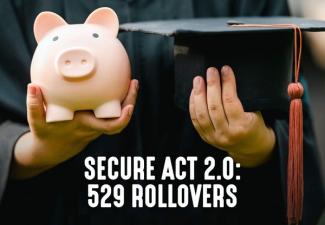
SECURE Act 2.0: Important 529 Plan Changes for Parents
The SECURE Act 2.0 was signed into law at the end of 2022, and it contained quite a few provisions that impact retirement planning. We discussed some of these here a few weeks ago, but we wanted to spend a bit of extra time on one of the most impactful changes we've seen in the new legislation, and that is a huge update to the allowed usage of 529 plans.
What Are 529 Plans?
Section 529 plans are a college savings vehicle offered by most states in the U.S. as a place for parents to save money for college on a tax-deferred basis.
In order to use the funds tax-free, typically, 529 money must be dedicated to education expenses like college tuition (or sometimes private school costs). Taking money out for other "non-qualified" purposes generally triggers penalties and taxes.
Meaning that if your kid didn't go to a qualified K-12 or college or didn't use up the funds because they received a scholarship, you didn't have a lot of options for the money in the account that didn't come with penalties.
Sure, you could change the beneficiary so the money went to pay for another child's education, but that was about it - and what if you didn't have any other children?
New Changes to 529 Plan Rules
However, a lot of that is about to change for some 529 plan owners.1
Starting in 2024, 529 funds that don't get used for education will be able to roll over to the beneficiary's Roth IRA, free of taxes and penalties. (Yes, that means the money could be essentially tax-free - forever!)
BUT — and there's usually a but — there are some pretty significant caveats and limitations we need to keep in mind:
- Rollovers will count as contributions and can't exceed the annual ROTH IRA contribution limit ($6,500 in 2023)
- Rollovers can only be made to the beneficiary's Roth IRA (i.e. the child's) and not the account owner's
- The 529 account must have been open for at least 15 years (and possibly be in the same beneficiary's name for that period - details are still pending on this aspect)
- You can't roll over contributions (or their earnings) made in the last five years
- There’s a $35,000 lifetime cap on rollovers
Are 529 rollovers a big deal?
We think they could be - for some people. Not everyone will be able to benefit, but those that can will have a much better option for left over education savings that have not been used to pay for college.
Imagine the boost you could give your child's retirement over their lifetime...
For example, imagine your child graduates college with funds still in their 529 account. So you roll the remainder to a Roth IRA in their name, because you know that investing early in life is the best way to put time on their side. The money grows for the next 45 years, tax-free.
They could kick off their retirement with a sizable tax-free nest egg. All courtesy of you and your forethought. Imagine the gift you could be giving your children (and even grandchildren) by giving them such a financial head start!
If you have 529 plan funds remaining after sending your children to college, this new legislation provides a better option than simply pulling the money out and paying taxes and penalties. Instead, you can use it to set your children up for the future.
This new rule may take the pressure off some parents who are worried about what to do with their college savings if their child doesn't go to college, but as we noted above, there are a number of caveats, so be sure you understand the stipulations before you assume you can take advantage of the new rollover option.
Have questions about 529 accounts or the new SECURE Act 2.0 changes? Schedule a time to chat with one of our financial professionals today.
Sources:
Risk Disclosure:
Investing involves risk including the potential loss of principal. No investment strategy can guarantee a profit or protect against loss in periods of declining values. Past performance does not guarantee future results.
This material is for information purposes only and is not intended as an offer or solicitation with respect to the purchase or sale of any security. The content is developed from sources believed to be providing accurate information; no warranty, expressed or implied, is made regarding accuracy, adequacy, completeness, legality, reliability, or usefulness of any information. Consult your financial professional before making any investment decision. For illustrative use only.
This information is not intended to be a substitute for specific individualized tax advice. We suggest that you discuss your specific situation with a qualified tax professional.
